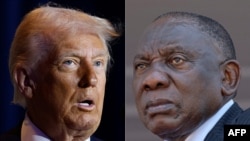Groups representing some of South Africa's white minority responded Saturday to a plan by President Donald Trump to offer them refugee status and resettlement in the United States by saying: thanks, but no thanks.
The plan was detailed in an executive order Trump signed Friday that stopped all aid and financial assistance to South Africa as punishment for what the Trump administration said were “rights violations” by the government against some of its white citizens.
The Trump administration accused the South African government of allowing violent attacks on white Afrikaner farmers and introducing a land expropriation law that enables it to “seize ethnic minority Afrikaners' agricultural property without compensation.”
The South African government has denied there are any concerted attacks on white farmers and has said that Trump's description of the new land law is full of misinformation and distortions.
On Saturday, two of the most prominent groups representing Afrikaners said they would not be taking up Trump's offer of resettlement in the U.S.
“Our members work here, and want to stay here, and they are going to stay here," said Dirk Hermann, chief executive of the Afrikaner trade union Solidarity, which says it represents about 2 million people. “We are committed to build a future here. We are not going anywhere.”
At the same news conference, Kallie Kriel, the CEO of the Afrikaner lobby group AfriForum, said: "We have to state categorically: We don’t want to move elsewhere."
Trump's move to sanction South Africa, a key U.S. trading partner in Africa, came after he and his South African-born adviser Elon Musk accused its Black leadership of having an anti-white stance. But the portrayal of Afrikaners as a downtrodden group that needed to be saved would surprise most South Africans.
“It is ironic that the executive order makes provision for refugee status in the U.S. for a group in South Africa that remains amongst the most economically privileged," South Africa's Foreign Ministry said.
There was "a campaign of misinformation and propaganda" aimed at South Africa, the ministry said.
Whites in South Africa still generally have a much better standard of living than Blacks more than 30 years after the end of the apartheid system of white minority rule in 1994. Despite being a small minority, whites still own about 70% of South Africa's private farmland. A study in 2021 by the South Africa Human Rights Commission said 1% of whites were living in poverty compared with 64% of Blacks.
Trump's action against South Africa has given international attention to a sentiment among some white South Africans that they are being discriminated against as a form of payback for apartheid. The leaders of the apartheid government were Afrikaners.
Solidarity, AfriForum and others are strongly opposed to the new land expropriation law, saying it will target land owned by whites who have worked to develop that land for years. They also say an equally contentious language law that's recently been passed seeks to remove or limit their Afrikaans language in schools, while they have often criticized South Africa's affirmative action policies in business that promote the interests of Blacks as racist laws.
“This government is allowing a certain section of the population to be targeted,” said AfriForum's Kriel, who thanked Trump for raising the case of Afrikaners.
The South African government says the laws that have been criticized are aimed at the incredibly difficult task of redressing the wrongs of colonialism and then nearly a half-century of apartheid, when Blacks were stripped of their land and almost all their rights.





